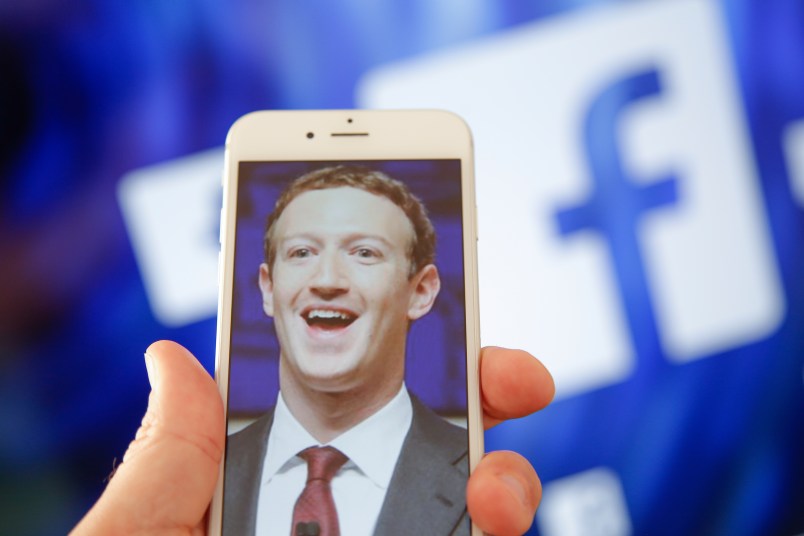In a reversal from its previous position, Facebook announced Thursday that it would hand over to Congress 3,000 advertisements bought over the course of the 2016 campaign by a Kremlin-linked Russian troll farm.
Mark Zuckerberg also appeared live on Facebook on Thursday afternoon to attempt to calm fears around abuse of his platform’s targeted ad system. But in addressing the public, the tech executive struck something less than a conciliatory tone.
Despite asserting that “the amount of problematic content that we’ve found so far remains relatively small,” Zuckerberg said firmly that the company couldn’t commit to catching every bad actor trying to misuse its advertising system.
He bluntly compared tightening internal advertising standards to prior restraint. “We don’t check what people say before they say it and I don’t think society should want us to,” Zuckerberg said. “Freedom means you don’t have to ask for permission first.”
Facebook agreed to turn over the Russian ads to Congress “in a manner that is consistent with our obligations to protect user information,” wrote Elliot Schrage, vice president of policy and communications, on the company blog. Schrage added that the company did not plan to turn the ads over to the public.
In his Facebook Live appearance, Zuckerberg didn’t cite user privacy as the rationale for not sharing the ads more broadly, but the company’s vulnerability in special counsel Robert Mueller’s probe into Russian election interference. Facebook had already shared the Russian ads with Mueller’s investigators.
“We’re going to be limited in what we can share regarding ongoing law enforcement operations,” Zuckerberg said. The company would continue its internal review, he told viewers, and Facebook execs “expect law enforcement to publish its findings when their investigations are complete.” The Mueller probe is not expected to close any time soon.
Facebook General Counsel Colin Stretch wrote in a separate blog post that the platform had “reached out to congressional leadership to agree on a process and schedule to provide the content of these ads, along with related information, to congressional investigators.”
Adam Schiff, ranking member of the House Intelligence Committee, welcomed the new data but said that Congress wanted greater oversight of Facebook’s process of self-reflection. “It will be important for the Committee to scrutinize how rigorous Facebook’s internal investigation has been, to test its conclusions and to understand why it took as long as it did to discover the Russian sponsored advertisements and what else may yet be uncovered,” Schiff wrote in a statement to press.
Facebook will adopt internal procedures to make large-scale scam operations like the Russian pro-Trump campaign “much harder,” Zuckerberg said.
“We’re going to make political advertising more transparent,” he promised. “When somebody buys political ads on TV or other media, you’re required by law to disclose who paid for them.”
On Facebook, political ads will now disclose “which page” paid for an advertisement, and users will be able to view the various ads being run by that page. Just how those pages would transparently correlate to any related political entities that exist off of Facebook, Zuckerberg didn’t say.
“I don’t want anyone to use our tools to undermine democracy,” Zuckerberg said. “That’s not what we stand for.”
Zuckerberg noted that candidates themselves had spent “tens of millions” of dollars on political ads on Facebook in 2016.







The prospect of prosecution does that.
“He bluntly compared tightening internal advertising standards to prior restraint. “We don’t check what people say before they say it and I don’t think society should want us to,” Zuckerberg said. “Freedom means you don’t have to ask for permission first.”” Shorter Zuckerberg: feel free to spew your lies on our platform, just so long as you are willing to pay for it, we won’t stop you
"“I don’t want anyone to use our tools to undermine democracy AGAIN,” Zuckerberg said
FIFY dickhead
…and people wonder why I refuse to establish a FB account.
If I wanted to know what someone ate for breakfast, lunch and dinner - and where they spent the afternoon, I would go to the attic, open a trunk, and read the diaries of my “spinster” great-aunts.
Zuckerberg initially lied about Facebook’s role in the election which is evidence of a guilty conscience. He must be held responsible for his company’s involvment in the Russian conspiracy to elect Trump.
I’m not First Amendment or privacy expert, but this all seems a bit silly on Facebook’s part.
Facebook is trying to avoid embarrassment. Too late Mark.